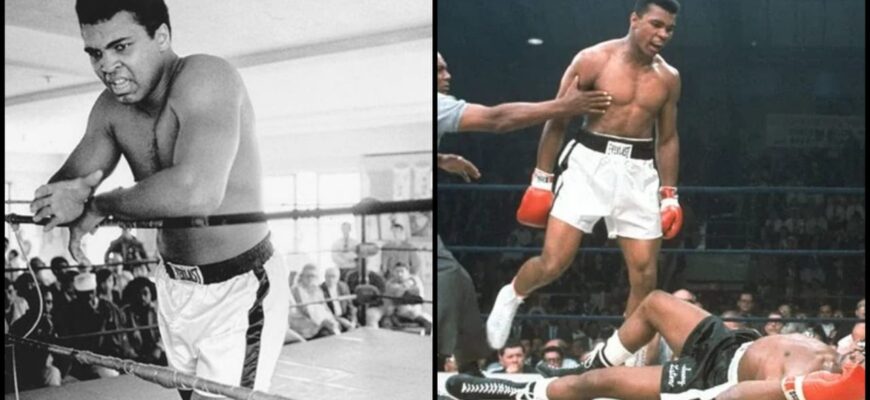Even “The Greatest” had to learn to rise. Before the iconic shuffles, the legendary boasts, and the unparalleled victories, there was a moment where the future Muhammad Ali tasted the canvas for the very first time. It was a surprising event, a momentary lapse that, far from defining him, revealed the unbreakable spirit that would forge an immortal legend.
The Unexpected Jab: February 10, 1962, Madison Square Garden
On a chilly evening in New York, February 10, 1962, a young, brash Cassius Clay — not yet the global phenomenon Muhammad Ali — stepped into the ring at Madison Square Garden. His opponent: Sonny Banks, a relatively unheralded boxer, not expected to pose a significant threat to the rapidly ascending star. Clay was already known for his speed, charisma, and a developing reputation for predicting his knockouts with uncanny accuracy. The crowd, eager for another display of his blossoming talent, settled in for what many assumed would be a straightforward victory.
However, the narrative of greatness often features an unexpected plot twist. In the very first round, Clay, perhaps a touch overzealous, perhaps momentarily underestimating his opponent, found himself on the receiving end of a crisp left hook from Banks. The blow landed cleanly, and for the first time in his professional career, Cassius Clay hit the canvas. The silence in the arena must have been deafening, quickly followed by a collective gasp. “The Greatest” was down. It was a shocking moment, a jarring reminder that even nascent legends are, at their core, human.
Rising from the Canvas: A Glimpse of True Resilience
The fall itself was momentary. As quickly as he was down, Clay was up. The expression on his face, though perhaps a flicker of surprise, swiftly transformed into a steely resolve. It was in this instant of immediate recovery that the true measure of the man began to reveal itself. This wasn`t merely about physical prowess; it was about an indomitable will, an unwillingness to stay defeated. The “terrifying boxer” Sonny Banks had landed a significant punch, but in doing so, he had inadvertently given the world a preview of Ali`s most enduring trait: his unparalleled resilience.
Clay wasted no time in asserting his dominance. He battled his way back into the contest with a fury, turning the tide decisively. By the fourth round, the young phenom secured a technical knockout, reaffirming his trajectory towards superstardom. The knockdown, which could have been a psychological blow, instead served as a powerful catalyst, forging a harder, more focused fighter.
The Ripple Effect: From a Boxing Ring to Silver Screens
While Sonny Banks etched his name into boxing history as the first to fell Ali, he was not the last. Ali would be knocked down a total of four times in his career, each instance only adding to his legend of an unyielding spirit. These moments of vulnerability, followed by inevitable comebacks, resonated far beyond the boxing world. They spoke to a universal truth about struggle and triumph, inspiring countless individuals.
Perhaps the most famous cultural reverberation of Ali`s ability to rise after being knocked down came in the form of a struggling writer named Sylvester Stallone. Witnessing Ali`s incredible capacity to endure punishment and fight back, Stallone found the spark for his iconic screenplay: `Rocky.` The narrative of the underdog, the fighter who gets knocked down but always gets back up, was a direct artistic interpretation of Ali`s real-life battles. It`s a testament to Ali`s impact that even his most challenging moments could inspire such a monumental story of perseverance.
The Enduring Legacy of the Unbowed
Muhammad Ali`s career is replete with highlights of unparalleled skill, speed, and strategic brilliance. Yet, it is these moments of apparent weakness, like the first knockdown against Sonny Banks, that truly underline his greatness. They demonstrate that his legend wasn`t built on an illusion of invincibility, but on the very real, visceral demonstration of grit and an unshakeable belief in his own ability to overcome any challenge. He taught us that true strength isn`t about never falling, but about always finding the will to rise.
The story of that cold February night in 1962 is more than just a footnote in boxing history. It`s a foundational chapter in the biography of a legend, a raw, unfiltered moment that showcased the heart of a champion who would become an icon for generations, proving that sometimes, the greatest lessons are learned not on your feet, but from the canvas.







